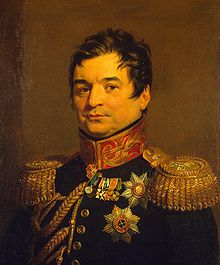| Alexander Balashov | |
|---|---|
 Portrait by George Dawe from the Military Gallery of the Winter Palace, c. 1819-22 Portrait by George Dawe from the Military Gallery of the Winter Palace, c. 1819-22 | |
| Born | Alexander Dmitriyevich Balashov (1770-07-13)13 July 1770 Moscow, Russia |
| Died | 8 May 1837(1837-05-08) (aged 66) |
Alexander Dmitriyevich Balashov (Russian: Алекса́ндр Дми́триевич Балашо́в) (13 July 1770 in Moscow – 8 May 1837) was a Russian general and statesman.
Balashov came from a noble family. When the boy turned 6 years, his father, a Privy Counsellor and Senator, had him enrolled in the Preobrazhensky Regiment though it was not until November 1781 that he entered the Page Corps, matriculating in 1787 with the rank of Kammer-page. On 9 January 1791 he joined the Izmaylovsky Regiment as lieutenant. From 1795 he was a lieutenant colonel in the regular army. He was promoted colonel in April 1798 and major general in 1799.
On 21 January 1800 Balashov was dismissed from the military service, but in November of the same year he was appointed governor general and chief of garrisons regiment in Tallinn. On 23 September 1804 he resigned for family reasons, but within three months he was appointed the chief of police in Moscow. In November 1807 he became the general-krigs-komissar, on 29 March 1808 he replaced Fyodor Ertell in the office of chief of police in Saint Petersburg and thereupon his career soared.
In February 1809 Alexander I conferred on Balashov the rank of adjutant general and appointed him the War Governor of Saint Petersburg. In March 1809 he was promoted to lieutenant-general. From 1 January 1810 he was a member of the newly established State Council. In June the same year he became the Minister of Police.
In 1812, during Napoleon's Invasion of Russia, Balashov was present in the front-line army stationed in Vilnius. After La Grande Armée crossed the frontier on June 12 (Julian Calendar), Balashov was dispatched to deliver the Emperor's letter to Napoleon. He participated in the organization of the People's Militia (Народное ополчение) and was a member of the extraordinary committee choosing the commander-in-chief of the Russian army.
After the Patriotic War of 1812 Balashov was involved in important diplomatic missions. Between 1819 and 1828, he served as the war governor general of Orel, Tula, Ryazan, Tambov and Voronezh. On 23 September 1834 Balashov resigned his office. He died on 8 May 1837 on his way to Kronstadt.
References
- This article includes content derived from the Russian Biographical Dictionary, 1896–1918.
- (in Russian) Dictionary of Russian Generals
| Preceded byDmitry Lobanov-Rostovskiy | War Governor of Saint Petersburg 1809–1810 |
Succeeded bySergey Vyazmitinov |
| Preceded byNew Creation | Minister of Police 1810–1812 |
Succeeded bySergey Vyazmitinov |
| Governors of Saint Petersburg | ||
|---|---|---|
| Governors General of Saint Petersburg Governorate (1703–1873) | ||
| Gradonachalniks of Saint Petersburg (1873–1914) and Petrograd (1914–1917) | ||
| Heads of Petrograd under Provisional Government (1917) | ||
| Chairs of Petrograd (1917-1924) and Leningrad (1924-1991) Executive Committee | ||
| Governors of Saint Petersburg (since 1991) | ||
| ||